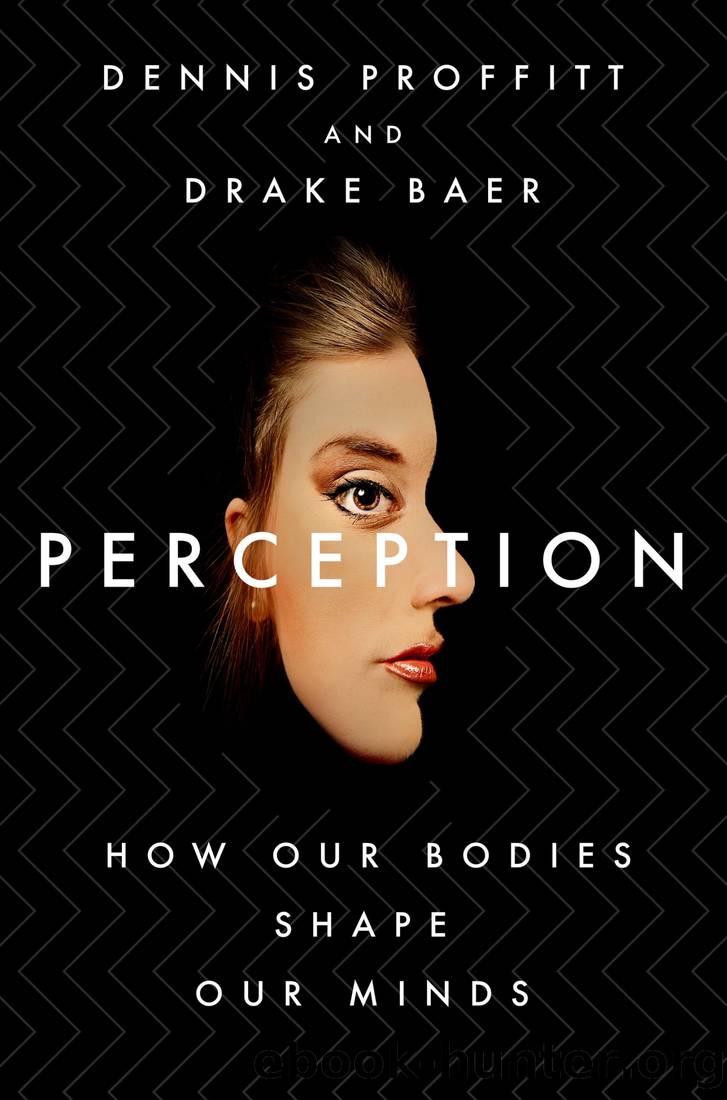Perception: How Our Bodies Shape Our Minds by Dennis Proffitt & Drake Baer

Author:Dennis Proffitt & Drake Baer [Proffitt, Dennis & Baer, Drake]
Language: eng
Format: epub
ISBN: 9781250219121
Google: FFC9DwAAQBAJ
Publisher: St. Martin's Publishing Group
Published: 2020-07-27T23:00:00+00:00
HOLDING HANDS IN THE MRI
JIM COAN, NOW A colleague of Denny’s at the University of Virginia, came to appreciate the vital importance of social support when he was doing his clinical psychology internship at the Southern Arizona VA hospital in Tucson. He was working with a World War II veteran who had late-onset PTSD. For most of his life, he had been symptom free. But now, as his condition grew worse, he refused standard treatment. His trauma was too much for him to even talk about. Coan tried relaxation therapy, where you ask the patient simply to breathe, but even just trying to relax was too stressful for his patient. Then he asked Coan a question, the answer of which that would forever change Coan’s psychological perspective: “Okay, but can I please bring my wife to therapy with me?”17
Coan said sure, and she accompanied him the next time. Coan asked the patient to begin relaxation exercises, and again he resisted. Then his wife scooched her chair over and took her husband’s hand. “It was like flipping on a light,” Coan says. His patient started doing the exercises, and eventually he started talking about his horrifying wartime experiences. But he would talk only if his wife was holding his hand.
Coan was inspired to explore this emotional interdependence in the lab. In one highly cited experiment, Coan and his colleagues placed married, heterosexual women in a brain scanner. The researchers simulated a stressful situation by telling the participants that they were about to receive a mild electric shock in each of three conditions—while they were alone, while they were holding the hand of a stranger, and while they were holding their husband’s hand. Holding someone’s hand was associated with less threat-related activity in the brain, especially when holding a partner’s hand. Most striking of all: the better someone felt about their marriage, the smaller was their fearful brain activation.
Several years later, Coan conducted a larger follow-up study with a more diverse set of relationships. For this hand-holding experiment, each of the 110 participants brought with them someone of another gender.18 About a quarter of these pairs identified as friends, another quarter were people who were dating, another cohabitating, and another married. For the threat of shock trials, the participants either held the hand of their partner, whom they had brought with them; the hand of a stranger; or were tested alone. Once again, brain regions associated with threat became less active when participants held their spouses’ hands, and more so for people who felt greater social support in their relationships. But there was a surprising result: this ameliorating effect wasn’t just found with spouses but also with boyfriends or girlfriends, and with platonic friends as well. The strangers were another story: holding their hands actually led to a magnified threat response.
So what’s happening when you hold the hand of someone you love? According to Coan, it’s the “social regulation of risk and effort,” which sounds abstract and theoretical but is actually vibrantly relatable.
Download
This site does not store any files on its server. We only index and link to content provided by other sites. Please contact the content providers to delete copyright contents if any and email us, we'll remove relevant links or contents immediately.
The Art of Thinking Clearly by Rolf Dobelli(8835)
Mindhunter: Inside the FBI's Elite Serial Crime Unit by John E. Douglas & Mark Olshaker(7827)
Change Your Questions, Change Your Life by Marilee Adams(6635)
Nudge - Improving Decisions about Health, Wealth, and Happiness by Thaler Sunstein(6629)
Mastermind: How to Think Like Sherlock Holmes by Maria Konnikova(6223)
The Power of Now: A Guide to Spiritual Enlightenment by Eckhart Tolle(4747)
Men In Love by Nancy Friday(4314)
Factfulness: Ten Reasons We're Wrong About the World – and Why Things Are Better Than You Think by Hans Rosling(4011)
The Confidence Code by Katty Kay(3560)
Thinking in Bets by Annie Duke(3526)
Man and His Symbols by Carl Gustav Jung(3309)
Three Women by Lisa Taddeo(2915)
The Worm at the Core by Sheldon Solomon(2910)
Why Buddhism is True by Robert Wright(2818)
Liar's Poker by Michael Lewis(2804)
The Inner Life of Animals by Peter Wohlleben(2763)
Descartes' Error by Antonio Damasio(2727)
The Power of Mindful Learning by Ellen J. Langer(2705)
The Slow Fix: Solve Problems, Work Smarter, and Live Better In a World Addicted to Speed by Carl Honore(2570)
